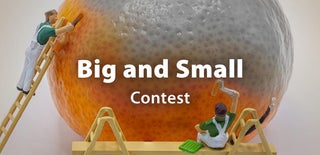Introduction: Post-apocalyptic Plastic Bottle Club
A distant future, year 2000, your door bell rings...
A man emerges in you'r doorway and asks if your name is John Connor...
...
Although highly unlikely, as long as the slimmest chance of you actually being the John Connor exist - you should be prepared to lead the resistance in days of future doom. And as we all know all the metall and good stuff will be already taken by the machines.
Fortunatelly humanity prepared themselfe for this scenario by strategically spreading plastic bottles in surplous quantities all around the planet.
Machines: one...
Mankind: also one!
...
Also, if you want to have one cool plastic bottle flask to match your weapon, you can find instructable on how to make ine here.
Supplies
So to make a dope spiked clubto kick them machinical asses you'll need a bunch of plastic bottles.
For this particular design:
- a few small ones (important they have long necks as mine)
- a few large plane ones (we count things in "fews" to annoy the machines and confuse their computations)
You'll also need some sort of filler. I used these foamed ceramic beads.. because machimes hate them.
Out of tools you'll need a heat gun, box cutter, scissors and a pair of gloves.
You'll also gonna need on of those bottle cutters that turn plastic bottles into strips (more on that later)
Step 1:
So, first of all take one small bottle and firmly fill it with beads. Put the lid on, but not screw it all the way down so the air could escape.
Step 2:
Set the heat gun to 200-300C. Use it thoroughly to shrink the bottle around the filler.
Wear the gleve when handling stuff to protect your fleshy hand from excessive heat.
Step 3:
From a second bottle cut the neck portion off. Make sure it at least partially slides over the bottom of the previous bottle. Then fill it with beads to that level.
Step 4:
Pull the filled bottle back onto the bottom of the first one and heat-shrink it as previously.
Uneven, lumpy texture provided by the ceramic beads ensures firm intrlocking between two bottles.
Add the third one in exact same way. You should obtain firm and rigid baton.
The more it end up looking as an oversised turd the more confused the machines will be in battle.
Step 5:
Take the remaining bottle necks and trim their lenght to more manageble (too wide edge may not shrink suficiently leaving upleasant flaps later).
Step 6:
Pull the bottle beck over the one incorporated into your baton (tie the lid tight beforehand) and shrink it over it.
Be careful not to overheat the plastic cause it may turn brittle and unfit for the handle.
Repeat the procedure with the second bottle neck. Make sure every next "hugs" over the lip of the previous.
Thus the handle is ready.
Step 7:
Now, for the spiky part we'll need about a dozen of large bottles.
Plain cylindrical bottles will work the best.
Cut the top bits off as shown.
Step 8:
Then cut the sides off on both sides of the neck forming the "wings" but do not get too close to it.
Repeat a dozen of times. Those are the future spikes.
Step 9:
To attach spikes to the club. We'll have to cut the bottoms of the afformentioned bottles to obtain tubes of plastic material.
Make sure not to leave snags on edges, and avoid sharp cuts into the material as they'll become the initiation points for teardowns during shrinking (which is bad)
Step 10:
Flatten the tube and cut series of semi-sircles on opposite sides about 3sm in diametre.
Step 11:
Insert the spikes into the holes from inside the tube, then slide the whole assembly over the shaft of the club.
Make sure the "wings" of the spike bases "hug" around the shaft.
Step 12:
After, positioning the spike assembly close to the working end of the baton and start applying heat to fix it on place.
Do not try to shring the whole thing in one go. It's better to apply heat to random splotches first untill the sleave more or less sits on place. At this point you can make adjustments and alignments required.
After that continue applying heat randomly untill the whole sleave sits on the shaft snuggly. The "wings" of the spikes will accomodate to the shape as well.
Be carefull not to overheat and deform the bottle necks. You may want to put the lids on to prevent it.
Step 13:
Add new section of spikes and proceed the same way.
Step 14:
Although at this point the club should already be quite firm and sturdy we need to finally reinforce it by using the plastic strip.
I'm not going spread widely about the strip cutter here. There's a dozens of designs you can find over the internet some of which may be done with little to no tools and materials. As an extreme measure one may just cut it in a spiral manner by hand using scissors.
A strip about 1-1,5cm wide will do. You may need to cut a few bottles to obtain needed amount.
Step 15:
The plastic strip is wrapped around the shaft and between the spikes in alternative fasion.
Start winding somewhere in the middle, and, while securing the strip with your finger, start winding toward the top.
At the top loop the strip around the spike and start winding down thus securing the end of the strip under new loops.
Keep winding toward the handle, and return back in alternate order, and remember, the more confused you are by my directions - the less predictable you are for the machines!
Step 16:
So I'm adding this part after I finished the instructable. There's one improvement to the club I should've made, but I didn't, but I'm mentioning it now.
There's two areas of the club that should be reinforced: the tip and the transition to the handle. I could've done this easily if I had an appropriately sized and shaped small bottle with a long neck. The bottom part of it would go over the end of the baton before installing the spikes and shrunk; and conical neck bit with the lid portion removed would cover the transition to the handle. Having that bottle in brown plastic would result in neatly uniformely colored final broduct.
Step 17:
After winding a bunch of strip we're ready to finish our weapon by utilising those spikes in the most devastating way possible.
Put a couple of small beads into each bottle neck and secure the lids. The rattling noise this thing makes during the combat is the most terrifying thing for homicidal robots of all kinds... use this power wisely.
Step 18:
Ok... IDK whare exactly to put this thing. Although it looks a bunch like a toy, one can definitelly bash someones cranial pumpkin open with it. This is the reason why I decided not (and did not recommend) using gravel or pebbles as filler. Even though foamed ceramic beads are pretty lightweight the resulting club feel quite noticable in a hand. I'm pretty sure it won't be quite acceptable for cossplay but at the moment I can't come up in my head with a sort of filler that would be lightweight yet firm enough to be worked this way. If you have any ideas and recomendations - let me know in the coments.
Step 19:
The idea for this project appeared when when I was playing around with all the stuff I can do with plastic bottles using simple techniques. It's somewhat long story, and I made quite a few clubs and maces before I figured this design which feels the most viable and least finicky. I may revisit the other design eventually and give definitive tutorials on them as well as showcasing some other cool sthings I've learned to do.
During making the tutorial I had a couple thoughts on minor improvements, but I guess I'll edit them in a bit later. They'll be down below, it's all for now, thak you for your attention and I'll be back.

Participated in the
Plastic Challenge













